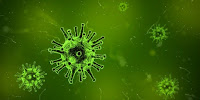What do viruses and bacteria look like?
Viruses are different from bacteria in many ways, and not all viruses look alike. Bacteria don’t all look the same either. Here are some things that make them different.Images by Arek Socha from Pixabay.
How do you fight an infection of virus vs bacteria?
Viruses and bacteria that make a home in your body can make you sick. The solution for each is found right in the name: Anti-biotics fight the biotic, living bacteria. Anti-virals fight the viral infection caused by viruses. But not every virus and bacteria has a medicine to fight it.An antibiotic cannot fight a virus, and vice versa.
Not all bacteria are killed by the same antibiotic medications.
Not all viruses are killed by the same antiviral medicines. Medicine has to be matched to the specific problem.
Amazing fact: Bacteria can catch a virus!Some viruses can be prevented by taking a vaccine before you are exposed to the virus! Each vaccine fights a specific virus. Flu vaccines change every year to match the particular type of flu that is spreading that year, since flu (influenza) is a whole family of viruses. In Canada, most people take a group of vaccines when they are children, to prevent once-common deadly illnesses like chickenpox, measles, and mumps. When we travel to foreign places, we can take vaccines to prevent picking up viruses that are widespread there; hepatitis and malaria are common viruses that travellers get vaccinated against.
Animals get vaccinated against viruses such as rabies. Viruses and bacteria make animals sick too, but not always the same ones that make humans sick.
Your doctor will determine whether it is a virus or bacteria that is making you sick. Or it may be a different illness! They will prescribe the right medicine for the job, if that is an option.
Amazing fact: Some kinds of bacteria are good for you! Probiotics are an example of bacteria that are helpful in your stomach.

